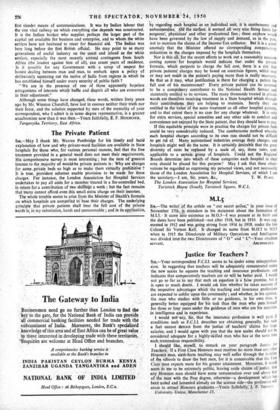The Private Patient
SIR.—May I thank Mr. Warren Postbridge for his timely and lucid explanation of how and why private-ward facilities are available in State hospitals for those who, for various personal reasons, feel that the free treatment provided in a general ward does not meet their requirements. His comprehensive survey is most interesting ; but the item of 'greatest interest to the majority of would-be private patients is: Why are charges for some, private beds so high as to make them virtually prohibitive ? It is true, provident schemes enable provision to be made for these charges. For instance, the London Association for Hospital Services undertakes to pay all costs for a member treated in a fee-controlled bed, in return for a contribution of two shillings a week ; but the fact remains that many cannot afford even this small extra charge on their incomes.
The whole trouble seems to arise from the Minister of Health's formula on which hospitals are compelled to base their charges. The underlying principle that private patients shall bear the full cost of the private wards is, in my submission, harsh and unreasonable ; and in its application,
by regarding each hospital as an individual unit, it is cumbersome and unbusinesslike. Ott the surface, it seemed all very nice fixing limits for surgeons', physicians' and other professional fees ; these anyhow would have been governed by the -law of supply and demand, as in the past, not to mention the claims of the Income-Tax collector. But it is a queer anomaly that the Minister offered no corresponding compensatory reductions in the charges imposed by the hospitals themselves.
Nor is this all, for the recent efforts to work out a reasonably accurate costing system for hospitals would indicate that under the present formula, which purports to charge the full cost, there is a risk that private patients' charges may be based on uncertain figures, which may or may not result in the patient's paying more than is really neceshiry. Be that as it may, what justification is there for charging a patient the full cost of his maintenance? Every private patient can be assumed to be a compulsory contributor to the National Health Service and statutorily entitled to its services. The many thousands treated in private wards are therefore receiving treatment in a State hospital which through their contributions they are helping to maintain. Surely they are entitled to the value Of the same treatment as all other hospital patients, and to that extent there is no case for any charge whatever. It is only for extra services, special amenities and any other aids to comfort and convenience not enjoyed by the State patient, that they should have to pay.
If this equitable principle were in practice the charges for private beds could be very considerably reduced. The cumbersome method whereby each hospital charges according to its own rate should not be difficult to get rid of. Many nationalised industries average their charges, and hospitals might well do the same. It is certainly desirable that the great diversity of rates be replaced by a scale of, say, three rates, each applicable to a certain group of hospitals. Could not the Regional Boards determine into which of these categories each hospital in their area should be placed for this purpose? May I ask that these obser- vations be regarded as expressing my personal views, and not necessarily those of the London Association for Hospital Services, of which I am
the secretary,—I am, Sir, yours, &c., T. W. PLACE. The London Association for Hospital Services, Tavistock House (South), Tavistock Square, W.C.1.














































































 Previous page
Previous page